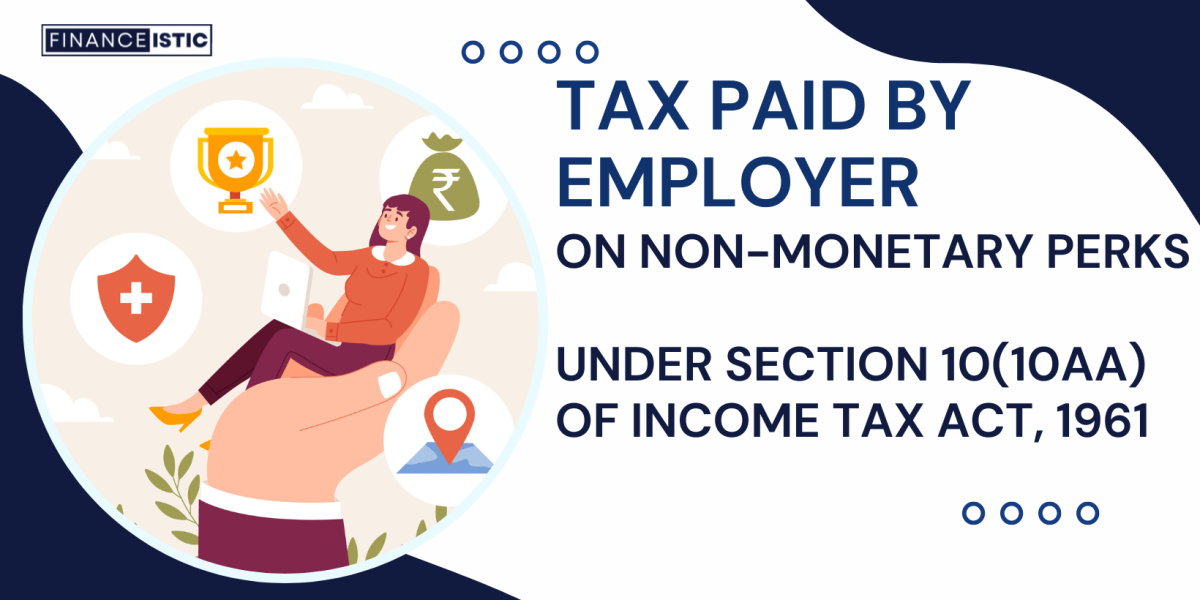The Income Tax Act, 1961 includes various exemptions and deductions for taxpayers under section 10. Section 10(10CC) of Income tax act also provide tax exemption for tax paid by employer on non-monetary perquisites. In this article, we will explain Section 10 (10CC) of Income tax act and eligibility under this section.

Table of Contents
What is section 10(10CC) of Income Tax Act 1961?
Section 10(10CC) of Income tax act provide the tax exemption to employee for amount equal to income tax paid by employer on non-monetary perquisite if:
- The employee receive income in the form of a perquisite as defined under section 17(2) of Income Tax Act.
- This perquisite is non-monetary.
- The employer pays the income tax on behalf of the employee for this non-monetary perquisite received by employee.
What is the meaning of the term ‘perquisites’ as per Income Tax Act?
A perquisite means to any additional benefit provided by employer to an employee in addition to their regular salary or wages. Perquisites can be in cash (monetary) or kind (non-monetary). As per section 17(2), perquisites include:
- The value of any concession in rent for accommodation provided by the employer.
- The value of rent-free accommodation which is provided by the employer.
- The value of any amenity or benefit given either free or at a concessional rate in specified cases.
- The value of specified securities or sweat equity shares allotted or transferred by the employer, either free or at a concessional rate.
- The value of any other prescribed fringe benefit or amenity.
- Sums paid by the employer to secure life insurance or an annuity contract for the employee.
- Amounts paid by the employer to cover obligations that the employee would otherwise have to pay.
- Employer contributions to an approved superannuation fund that exceed INR 1.50 Lakhs.
Please note that section 10(10CC) does not apply on tax paid on monetary perquisites.
What are the conditions to avail the Exemption u/s 10(10CC)?
To avail the tax exemption under section 10 (10CC) of Income tax act, you need to fulfil the below conditions also:
- No Tax exemption for Employer: Employees only can receive a tax exemption on these non-monetary benefits. The employer cannot take tax exemption for the tax paid on these benefits as a deduction in their own tax returns.
- Employer’s Decision: Employer has right to decide whether he wants to pay income tax on non-monetary benefits or not. Employees cannot request or demand for this benefit.
- Documentation Requirement: Employees are required to get relevant documents from their employer for the value of the non-monetary benefit and the tax paid on it to support their ITR filing.
Section 10(10CC) of income tax act with example
For instance, an employee receives a company car from their employer with ₹50,000 of the annual value of the car benefit as determined by tax rules. The employer decides to pay the income tax on this benefit. Hence the employee does not need to include ₹50,000 of car benefit in their taxable income as the employer has already paid the tax on this benefit.
Benefits of Section 10(10CC) of Income Tax Act
Here is the benefits of section 10 (10CC) of Income tax Act 1961:
- Higher Pay: The employee effectively increases their take-home pay by excluding the value of the benefit from taxable income.
- Lower Tax Liability: This tax exemption reduce the overall tax burden of employee.
Read Also: Section 10(10AA) of Income Tax Act, 1961 – Leave Encashment
Final Words
Section 10(10CC) of Income Tax Act provides a tax exemption for employees receiving non-monetary perks from their employer opting to pay the associated taxes. Understanding this provision can help both employers and employees in making informed decisions about the tax implications of such benefits.
Frequently Asked Questions (FAQ)
These are those perquisites which are provided by employer to employee in the form of kind like car, rent free accommodation etc.